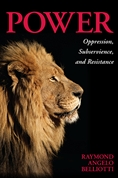



By coincidence, chance or intent, the release of “Power: Oppression, Subservience and Resistance,” the newest book by Distinguished Teaching Professor Raymond Angelo Belliotti is occurring during a Presidential election year.
 |
Dr. Belliotti analyzes and evaluates the role of power in everyday life, and says that a “cluster of questions animates” his 18th book, to be published in April by SUNY Press. Among the all-encompassing questions that Belliotti poses are:
How are we to judge appropriate from inappropriate exercises of power and acceptable from unacceptable relations of power? What normative standards permit us to justify acts of rebellion and efforts to transform extant power relations? How and why is resistance implicated in power’s basic constitution and to what extent do relations of power constitute the human subject? What is the relationship of power to knowledge, to our normative notions of morality and justice? Is it possible to pontificate about power from a vantage point not already contaminated by the effects of oppression? How much and what types of power facilitate human fulfillment?
Belliotti addresses these questions by examining the works of Greek philosopher Plato, German philosophers Georg Wilhelm Friedrich Hegel, Ju̎rgen Habermas and Friedrich Nietzsche, Italian Renaissance philosopher Niccolò Machiavelli, Italian Marxist Antonio Gramsci, French philosopher Michel Foucault and contemporary feminists.
Frequently understood in simplistic and often highly negative terms, the concept of power has proven to be both uncommonly intriguing and maddeningly elusive, noted Belliotti. In the book, he begins by fashioning a general definition of power that is refined enough to capture the numerous types of power in all their multifaceted complexity.
Belliotti then proceeds in a series of discrete yet thematically connected meditations to explore the meaning of power as it was understood in ancient, modern and contemporary thought.
In grappling with the critical questions surrounding the accumulation, distribution, and exercise of personal and social power, the book allows readers to confront fundamental questions of who they are and how they might live better lives.
SUNY Buffalo State Professor Kimberly Blessing noted, “Belliotti offers an exhaustive discussion of the philosophical notion of power, which deepens the reader’s understanding of power and provides a ‘powerful’ tool for assessing the proper use of and abuses of social and dyadic power relations.
“The book is rich with material, expertly organized and written in a clear and accessible style,” Dr. Blessing concluded.
Other books written by Belliotti address issues in jurisprudence, sexual ethics, ethnic identity, Nietzsche, the meaning of life, human happiness, philosophy and baseball, Machiavelli, Roman philosophy, posthumous harm, why philosophy matters, Dante, Shakespeare and Jesus.